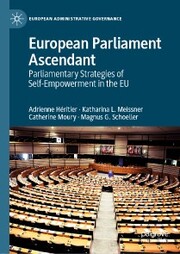Detailansicht
European Parliament Ascendant
eBook - Parliamentary Strategies of Self-Empowerment in the EU, European Administrative Governance
Moury, Catherine/Schoeller, Magnus G/Meissner, Katharina L et al
ISBN/EAN: 9783030167776
Umbreit-Nr.: 7659146
Sprache:
Englisch
Umfang: 0 S., 2.07 MB
Format in cm:
Einband:
Keine Angabe
Erschienen am 08.06.2019
Auflage: 1/2019
E-Book
Format: PDF
DRM: Digitales Wasserzeichen
- Zusatztext
- <div>"If one wants to understand why, from its modest beginnings, the European Parliament has become a major player in EU decision-making, look no further than this book. It presents, to date, the theoretically most compelling, methodologically disciplined and empirically richest account of parliamentary self-empowerment over time, across key functions and policy areas. This volume will be a main point of reference for work on the European Parliament, the dynamics of inter-institutional politics, and EU integration more generally for years to come."</div><div>Berthold Rittberger, Professor of International Relations, University of Munich, Germany</div><div><br></div><br><div>Anyone interested in the rise of the European Parliament as a significant actor in the EU should read this book. It offers a fascinating insight into the strategies used by the Parliament to achieve its aims and the conditions for its success or failure. It ranges widely across time and policy areas to give a comprehensive analysis of the Parliaments changing institutional position.</div><div>Michael Shackleton, Professor of European Institutions, Maastricht University, The Netherlands, and former EP official</div><div><br></div><div><br></div><div>This book analyses the European Parliaments strategies of self-empowerment over time stretching across cases of new institutional prerogatives as well as substantive policy areas. It considers why and how the Parliament has managed to gain formal and informal powers in this wide variety of cases. The book provides a systematic and comparative analysis of the European Parliaments formal and informal empowerment in two broad sets of cases: on the one hand, it examines the EPs empowerment since the Treaty of Rome in three areas that are characteristic of parliamentary democracies, namely legislation, the budget, and the investiture of the executive. On the other hand, it analyses the European Parliaments role in highly politicised policy areas,namely Economic and Monetary Governance and the shaping of EU trade agreements.</div><div><br></div>
- Kurztext
- &quote;If one wants to understand why, from its modest beginnings, the European Parliament has become a major player in EU decision-making, look no further than this book. It presents, to date, the theoretically most compelling, methodologically disciplined and empirically richest account of parliamentary self-empowerment over time, across key functions and policy areas. This volume will be a main point of reference for work on the European Parliament, the dynamics of inter-institutional politics, and EU integration more generally for years to come.&quote;-Berthold Rittberger, Professor of International Relations, University of Munich, Germany&quote;Anyone interested in the rise of the European Parliament as a significant actor in the EU should read this book. It offers a fascinating insight into the strategies used by the Parliament to achieve its aims and the conditions for its success or failure. It ranges widely across time and policy areas to give a comprehensive analysis of the Parliament's changing institutional position.&quote;-Michael Shackleton, Professor of European Institutions, Maastricht University, The Netherlands, and former EP officialThis book analyses the European Parliament's strategies of self-empowerment over time stretching across cases of new institutional prerogatives as well as substantive policy areas. It considers why and how the Parliament has managed to gain formal and informal powers in this wide variety of cases. The book provides a systematic and comparative analysis of the European Parliament's formal and informal empowerment in two broad sets of cases: on the one hand, it examines the EP's empowerment since the Treaty of Rome in three areas that are characteristic of parliamentary democracies, namely legislation, the budget, and the investiture of the executive. On the other hand, it analyses the European Parliament's role in highly politicised policy areas, namely Economic and Monetary Governance and the shaping of EU trade agreements.
- Autorenportrait
- <div>Adrienne Héritier is Emeritus Professor of Social and Political Sciences at the European University Institute, Italy. Her research focuses on European policy-making, comparative public policy, European decision making processes, theories of institutional change and deregulation, and re-regulation and new modes of governance. </div><div><br></div><div>Katharina L. Meissner is an assistant professor at the Centre for European Integration Research (EIF), Department of Political Science, University of Vienna, Austria. Her research interests include European Union Foreign Policy, International Trade and Security Relations, International Political Economy and Regional Integration. </div><div><br></div><div>Catherine Moury is Senior Lecturer in the Department of Political Studies, at the New University of Lisbon, Portugal. Her current research is focused on Comparative Politics and EU studies.</div><div><br></div><div>Magnus G. Schoeller is a postdoctoral researcher at the Centre for European Integration Research (EIF), Department of Political Science, University of Vienna, Austria. His work focuses on European politics, EU economic and monetary policy, and political leadership.</div>
